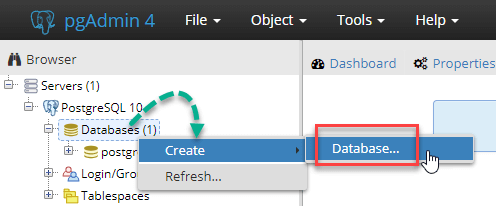Postgresql How To Create Database From Sql File
The syntax to create database in PostgreSQL is
CREATE DATABASE databasename
Let's learn setting up PostgreSQL and how to create database in PostgreSQL command line and the GUI
PSQL Create Database Command Line (SQL Shell)
Step 1) Open the SQL Shell

Step 2) Press enter five times to connect to the DB

Step 3) Enter the command
CREATE DATABASE guru99;

Step 4) Enter command \l to get a list of all databases

Step 5) To connect to a Database use PostgreSQL database command
\c guru99

Prompt changes to guru99 which signifies that we are connected to database guru99 and can perform operations like create table, trigger, execute SQL on it.
PostgreSQL Create Database using pgAdmin
Step 1) In the Object Tree, right click and select create a database to Postgres create database

Step 2) In the pop-up,
- Enter Database Name
- Comment if any database – optional
- Click Save

Step 3) DB is created and shown in the Object tree.

Step 4) The right pane gives you the SQL used to create the Database.

Complete syntax to create a database
Here is complete Syntax to create a DB in PostgreSQL
CREATE DATABASE db_name OWNER = role_name TEMPLATE = template ENCODING = encoding LC_COLLATE = collate LC_CTYPE = ctype TABLESPACE = tablespace_name CONNECTION LIMIT = max_concurrent_connection
| Option | Description |
|---|---|
| db_name | Use this option to specify the name of the new database that you want to create. Although, you need to make sure that the database must be unique because If you attempt to create a new database with the same name as an existing database, PostgreSQL will display an error. |
| role_name | Use this parameter to define the the role name for the user who will own the new database. Default is postgres |
| Template | You can specify database template name from which you want to creates the new database. |
| Encoding | This parameter allows specifying character set encoding for the new database. Default is UTF8 |
| Collate | The collation parameter specifies the sort order of strings which affect the result of the ORDER BY clause while using a SELECT statement. |
| Ctype | It specifies the character classification for the new database. It affects the categorization, e.g., digit, lower and upper. |
| tablespace_name | Using this option you can specify the tablespace name for the new database. The default is the template database's tablespace. |
| max_concurrent_connection | Use this option to specify the maximum concurrent connections to the new database. The default is -1, i.e., unlimited. |
Common Errors while using the createdb command
| Error | Description |
|---|---|
| createdb command not found. | This kind of error may occur when PostgreSQL is not installed correctly. At that time, you need need to run createdb command from your PostgreSQL installation path. |
| No such file in the server is running locally and accepting connections on Unix domain socket. | This error occurs when PostgreSQL Server is not started properly, or it was not started where the createdb command wants it to start. |
| FATAL role "usr name" does not exist | This error may occur if the PostgreSQL user account is created which are different from system user accounts. |
| Permission denied to create a database | If the PostgreSQL account is created does not have permission to create a database In this case, you need to grant permission to the associated users to access create command. |
Summary
- You can create a database using the psql Windows Command Line (SQL Shell) with the command " CREATE DATABASE databasename
- You can also create a database using pgAdmin by following this step: In the Object Tree > right click on Database > Select create a database
- One of the common errors encountered when create database command fails is that the server is not initialized correctly. Rebooting the server solves the issue
Postgresql How To Create Database From Sql File
Source: https://www.guru99.com/postgresql-create-database.html
Posted by: smallhealf1997.blogspot.com

0 Response to "Postgresql How To Create Database From Sql File"
Post a Comment